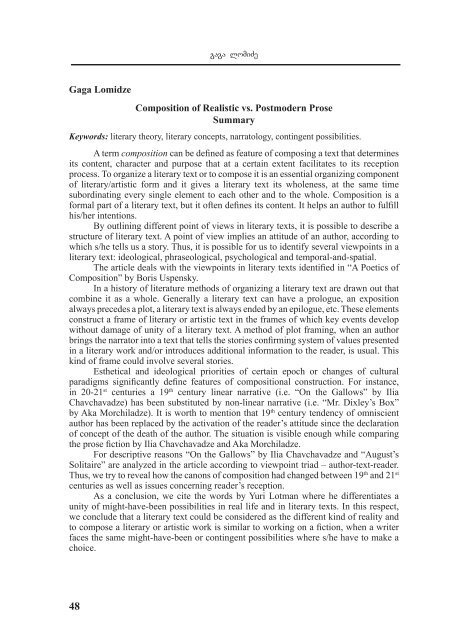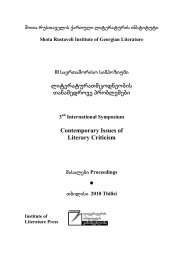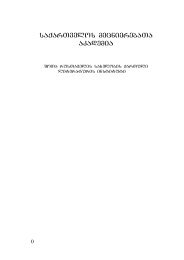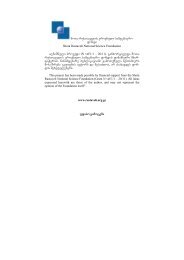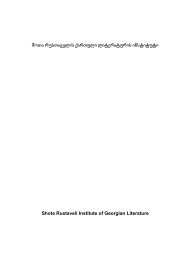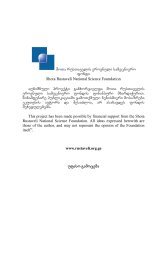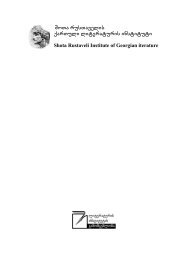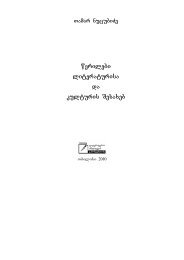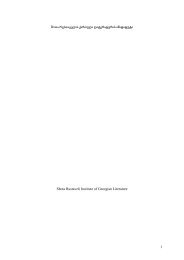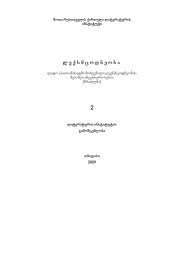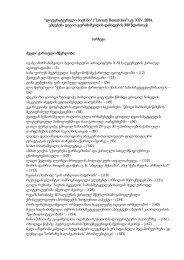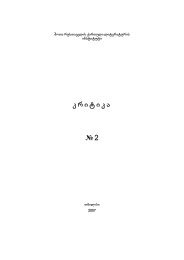SoTa rusTavelis qarTuli literaturis instituti - Tbilisi State University
SoTa rusTavelis qarTuli literaturis instituti - Tbilisi State University
SoTa rusTavelis qarTuli literaturis instituti - Tbilisi State University
Create successful ePaper yourself
Turn your PDF publications into a flip-book with our unique Google optimized e-Paper software.
Gaga Lomidze<br />
48<br />
gaga lomiZe<br />
Composition of Realistic vs. Postmodern Prose<br />
Summary<br />
Keywords: literary theory, literary concepts, narratology, contingent possibilities.<br />
A term composition can be defined as feature of composing a text that determines<br />
its content, character and purpose that at a certain extent facilitates to its reception<br />
process. To organize a literary text or to compose it is an essential organizing component<br />
of literary/artistic form and it gives a literary text its wholeness, at the same time<br />
subordinating every single element to each other and to the whole. Composition is a<br />
formal part of a literary text, but it often defines its content. It helps an author to fulfill<br />
his/her intentions.<br />
By outlining different point of views in literary texts, it is possible to describe a<br />
structure of literary text. A point of view implies an attitude of an author, according to<br />
which s/he tells us a story. Thus, it is possible for us to identify several viewpoints in a<br />
literary text: ideological, phraseological, psychological and temporal-and-spatial.<br />
The article deals with the viewpoints in literary texts identified in “A Poetics of<br />
Composition” by Boris Uspensky.<br />
In a history of literature methods of organizing a literary text are drawn out that<br />
combine it as a whole. Generally a literary text can have a prologue, an exposition<br />
always precedes a plot, a literary text is always ended by an epilogue, etc. These elements<br />
construct a frame of literary or artistic text in the frames of which key events develop<br />
without damage of unity of a literary text. A method of plot framing, when an author<br />
brings the narrator into a text that tells the stories confirming system of values presented<br />
in a literary work and/or introduces additional information to the reader, is usual. This<br />
kind of frame could involve several stories.<br />
Esthetical and ideological priorities of certain epoch or changes of cultural<br />
paradigms significantly define features of compositional construction. For instance,<br />
in 20-21 st centuries a 19 th century linear narrative (i.e. “On the Gallows” by Ilia<br />
Chavchavadze) has been substituted by non-linear narrative (i.e. “Mr. Dixley’s Box”<br />
by Aka Morchiladze). It is worth to mention that 19 th century tendency of omniscient<br />
author has been replaced by the activation of the reader’s attitude since the declaration<br />
of concept of the death of the author. The situation is visible enough while comparing<br />
the prose fiction by Ilia Chavchavadze and Aka Morchiladze.<br />
For descriptive reasons “On the Gallows” by Ilia Chavchavadze and “August’s<br />
Solitaire” are analyzed in the article according to viewpoint triad – author-text-reader.<br />
Thus, we try to reveal how the canons of composition had changed between 19 th and 21 st<br />
centuries as well as issues concerning reader’s reception.<br />
As a conclusion, we cite the words by Yuri Lotman where he differentiates a<br />
unity of might-have-been possibilities in real life and in literary texts. In this respect,<br />
we conclude that a literary text could be considered as the different kind of reality and<br />
to compose a literary or artistic work is similar to working on a fiction, when a writer<br />
faces the same might-have-been or contingent possibilities where s/he have to make a<br />
choice.


